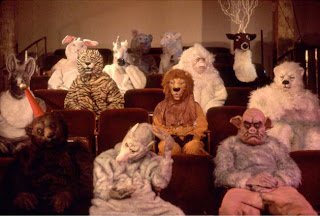The Islands of Raw are a safe haven and paradise for anyone with transcendentalist beliefs. A society tucked away in the Pacific Ocean, southeast of Hawaii, it would seem to be the only society that is and ever could be perfect. It would be a euphoric experience for one to live there and to truly be oneself. However, the Islands of Raw are the complete opposite from a perfect society, as it would never be able to exist in today’s world. Although the concept would appeal to the masses, the Islands of Raw would have the critical difficulties of not having issues that do not go against the definition of transcendentalism; such as being discriminatory and having rules. In addition to the anti-transcendentalism the society would have in these current times, there are the desperate issues of the Islands’ economy and jobs, and the lack of resources.
In today’s world, it seems that more and more people are embarking on the journey to find their selves. What better place to find one’s true self than at the Islands of Raw? It is truly an individuals’ paradise. The concept of the society is groundbreaking and simple; have a group of islands that are all special in their own way, and have the citizens experience all of them on the main island before deciding where they fit in best. All personalities are catered to, and it is impossible to not find a home on the island. This idea of living would appeal to the masses, therefore bringing enough people to the islands to live and allowing the islands to function properly. Unfortunately, this lovely little society couldn’t be possible for the same reason of mass appeal.
If the society appealed to the masses, then everybody would start flocking to the Islands of Raw. This migration is not necessarily good, as humans either lead or are led. Although the Islands of Raw target transcendentalists to live in the community, many would start moving to Raw just because others were. The Islands of Raw would no longer be a true transcendentalist community. There would be no solution to ratify this problem, as it would be exceptionally difficult to find a way to test citizens for transcendentalism. The conformist people would have to stay; as transcendentalists cannot be discriminatory, that being part of their beliefs. However, that would totally negate the idea of a transcendentalist society in the first place if conformists and followers were allowed to live there, just like how a transcendentalist society itself cannot be achieved.
Societies must have rules. Transcendentalists must break rules. This argument against the possibility of the Islands of Raw and all other utopian transcendentalist societies is pure logic. Transcendentalist societies cannot have rules, as someone’s genuine self could be imposed upon. However, if there are no rules, is there really a society? Order and safety are only possible by following rules. However, transcendentalists are told to break rules and be themselves. Back to the problems specific to the Islands of Raw is the fact that there would be an issue of jobs.
In the Islands of Raw, citizens are allowed to make their own life decisions. One of these crucial decisions is which occupation they choose to perform. In today’s society, there are many people who complain about their jobs, as they dislike them and only continue working to get paid. They may be just overreacting, but there truly are some undesirable but essential jobs to a society. These fall under such categories as waste management or plumbing. In the Islands of Raw, no one can force anyone to take a certain job. The problem with this is that many will chose a desirable job, such as being an artist or writer, instead of an unwanted but essential to society one. With the lack of some undesirable jobs, society could not properly function, just as it wouldn’t without resources.
Today, the world is a very uncertain place. There are countless problems with just about every country’s economy, and there seems to be a worldwide recession in progress. Even the Islands of Raw would not be excluded from it. There is no guaranteed successful economy. It would also need to be invested in, as it doesn’t exist yet. With a dodgy market, many won’t invest in something that they won’t get a definite return on. Also, there are no islands southeast of Hawaii. In addition to that, the technology for transparent underwater walkways that would be the transportation between island to island does not exist yet.
The Islands of Raw would be a great place to live with it's mass appeal, but it's just not possible to exist in today's society because of the definition of transcendentalism, it's problem with jobs, and the lack of resources in the world.

















